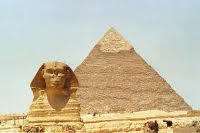|
|
Dawn of Egypt's democratic experiment
By Salman Shaikh
- February 14, 2011
 As people of all generations and backgrounds celebrate across Egypt this weekend, we are seeing history unfold. "Umm al-Duniya," the "mother of the world," has reawakened. So will the rest of its children around the region. Egyptians have changed the face of the region forever.
For too long, Egyptians have been in slumber, their lives marred by a sense of loss and by life's everyday indignities. Held back by the "big brother regime," which knew best for its people, the citizens lived under a collective sense of inferiority.
Now the events of the past few weeks in Egypt, and before that in Tunisia, have swept these sentiments away. What has been remarkable is not just that after 30 years President Hosni Mubarak has been ousted, but the way that this occurred. A new generation of 18- to 30-year-olds has organized its communities, stood up to the pressures of a dictator and his feared security forces, and countered with new ideas, when all seemed hopeless, to lead a nation of 84 million to freedom. Remarkably, the momentum remained with the street and its leaders, not in the presidential palace or with the professional opposition politicians, nor with Washington or anybody else. In this, the street has gained the respect of the world.
But in all the euphoria, we must remember that Mubarak's departure heralds only a beginning. For now, power has been transferred to the Supreme Council of the Armed Forces. It is not clear what comes next. There will be unease that Mubarak's decision has enabled a military coup, since there is no constitutional provision for such a move. Officially, the speaker of the parliament should have taken over.
What happens after Mubarak?
However, with the last parliamentary elections discredited as fraudulent, many will accept the military as the one national institution that can assume a responsibility for the transition. Reports indicate that the upper and lower houses of the Parliament have been abolished and the Cabinet disbanded. Egypt today is in the hands of the military.
The military will now have to take on arguably its most important role -- that of the guarantor of a political transition to a democratic system of governance in Egypt. It announced in a statement that it will guarantee changes to the constitution, free and fair elections, and an end to 30 years of emergency rule, "as soon as the current circumstances end."
The military will be intensely scrutinized. It will have to work on two tracks: first, to create enough confidence among the people to take them off the streets and bring normality back to the country; and second, to establish a national dialogue that includes all the main political parties and leads to agreement on constitutional and political reforms for the transition to free and fair elections.
The other guarantor of the new, democratic Egypt can be the United States. After days of zigzagging U.S. statements, which meant all things to all men and deeply disappointed those calling for Mubarak to leave, Vice President Joseph Biden set the right tone in the first official U.S. reaction. The transition, he said, "must be an irreversible change ... toward democracy." He added that "the future will be determined by the Egyptian people." In the debate over whether the U.S. should promote its values or its interests, Biden was surprisingly clear, stating that the U.S. stands for "a clear set of core values."
President Obama said Friday afternoon, "Nothing less than genuine democracy will carry the day." Let us hope that in this blighted region the U.S. finally means what it says. If so, it will play an important diplomatic and economic supporting role in the democratic transition of Egypt and other Arab countries. It must not miss this opportunity.
Ultimately, the future of Egypt lies with its people. With their extraordinary actions over the past three weeks, they are now the shareholders of the democratic experiment the country has begun. There will undoubtedly be frustrations and disappointments along the way, especially with expectations so high.
The military will have to deliver in the interim phase and then step back. Throughout the world, politicians in particular have the habit of disappointing those to whom they make promises.
Nevertheless, let us hope that the democratic transition in Egypt carries a genuine battle of ideas and a competition through the ballot box in the months ahead. Let us hope that Egyptians stay united and turn this extraordinary moment of hope into reality.
|
|
|
|
|
|  |
|
 As people of all generations and backgrounds celebrate across Egypt this weekend, we are seeing history unfold. "Umm al-Duniya," the "mother of the world," has reawakened. So will the rest of its children around the region. Egyptians have changed the face of the region forever.
As people of all generations and backgrounds celebrate across Egypt this weekend, we are seeing history unfold. "Umm al-Duniya," the "mother of the world," has reawakened. So will the rest of its children around the region. Egyptians have changed the face of the region forever.
 We recommend
We recommend



